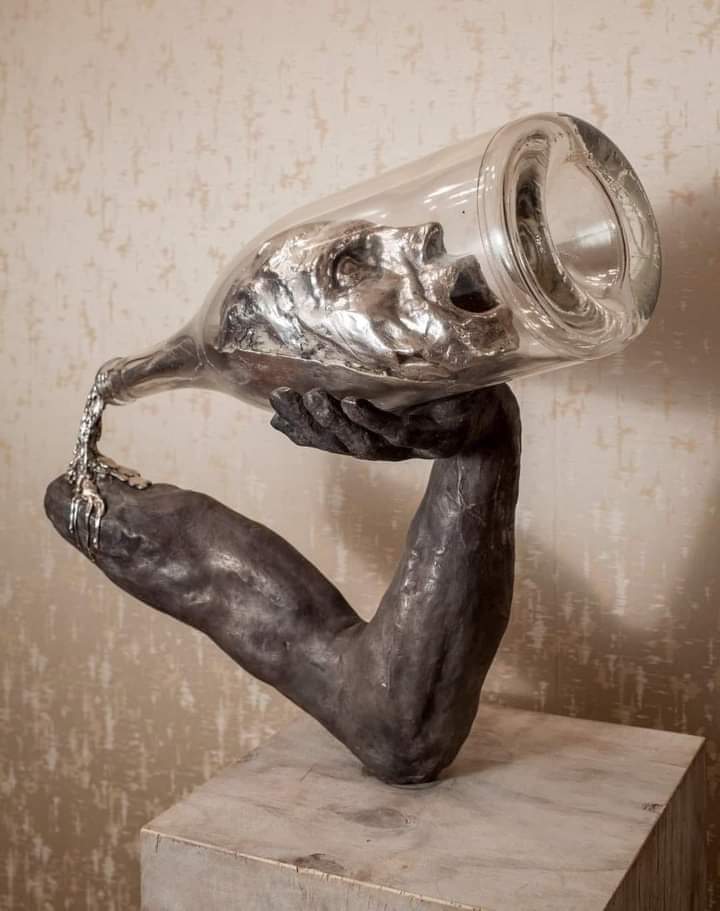By: Dan J. | Maryknoll, New York
July 1991
Fresh from a Fifth Step session with my sponsor, I turned to the Sixth Step. Gradually, very gradually, I became ready to have God remove my character defects–and God knows there were a lot of them!
That evening, I got home from a meeting and was ready for bed. It had been a long day. The blustery March night was cold and I was bone weary. With a smile on my face, I crawled into bed, folded my arms across my chest and realized, with some satisfaction, that on the following day all of my shortcomings would be a thing of the past. I was taking the Seventh Step, and I was at peace. After a tranquil night, I awoke knowing I had a clean slate.
Finally I got up–a bit late, but cheerful–because I was free at last of all those burdensome negative character traits which had kept me from making real progress. Leaving the bed unmade, and with shoes unshined, I bolted down my breakfast, and piled the dirty dishes in the sink. I headed off to work in a rush, for once again I was just a little behind schedule. On cloud nine, I did get to the office–only five minutes late. But what matter? I was free at last. Liberated! I managed to get in quite a bit of work in between coffee breaks and trips to the water cooler.
It was the new me. After all, I had humbly asked God to remove my shortcomings. Things were in his hands and God would take care of them. I didn’t have to worry about all those little bothersome details. They were molehills, nothing more. I didn’t need to worry about my shortcomings as long as he was working on them.
And then it came to me. The shortcomings were the molehills I had to take care of. I had addressed the mountains in Steps Four, Five and Six, but now it was time for the molehills–the bed unmade, the shoes unshined, dirty dishes piled in the sink–all those things I should have gotten around to and just never had. There were some pretty significant molehills out there. How about relationships with my family and friends? Didn’t they merit some attention? And my work? Was I putting in a full day’s work for a full day’s pay?
During my drinking days, I marched to a different drum. I seemed to abide by a philosophy which bore little resemblance to the Golden Rule. My basic attitude was, “What’s in it for me?” I would do what I was supposed to do, only if it was to my advantage. My work got done–but barely–because I did need to live. It was very inconvenient to have to go to work every day, but generally I did make it to the office. (Let’s not dwell on the days when I just couldn’t come in.) Naturally, I wasn’t being paid what I considered a just salary given my enormous talents. And just as naturally, if “they” weren’t going to pay me well “they” weren’t going to get much out of me!
You were my friend if you could give me a listening ear for my drunken and maudlin meanderings. That was a sign you appreciated the immensity of my intellect. You were a good friend if you would stand me to round after round of drinks, thereby demonstrating that you appreciated the company I offered.
Actually, I had a deep suspicion, barely admitted, that I really wasn’t such a great person. But if others would affirm me, if they would stand by me, then there was the proof that I was good. I soaked up such moral support like a blotter, like water poured over a dry brick. I needed that support to survive.

I used to think that I was absorbing the booze, deftly handling the drinks in my life. In reality, the gin was absorbing me.
Gin didn’t fit in me after a few years of heavy, heady drinking; I was fitting into the gin. I only did things which didn’t interfere with my drinking schedule. Evening work was out because I was useless after the “happy hour” had begun. Mornings weren’t too good either as I was suffering the agonies of the damned. Noon wasn’t bad but by then, the sun was over the yardarm and I could have a drink to erase the ravages of the previous day’s happy hour. I was pretty creative by one o’clock but by two I was beginning to get sleepy from the drinks that had accompanied lunch. I would come to just before five–because I didn’t want to leave a messy desk before going home. All in all, I had about an hour and a half of productive time in any one day.
I had long ceased caring about whether I did my work or not. If anyone called my attention to the fact that I was a nonproductive member of society, I became irate. What an insult. Don’t they know who I am?
I was, in reality, enormously egocentric. The word “egocentric” comes from the Latin and means that everything travels toward the center. The opposite of “ego-centric” is “ex-centric” meaning that everything moves out from the center. In other words, it means becoming a giver, one who serves others, one who reaches into his or her own inner reserve of strength to help another. In terms of the Seventh Step, I had to stop being a taker, an absorber. I had to become the responsible person I had not been. In short, I had to learn to take care of the molehills in my life.
What the AA program really calls us to is not to be egocentrics but to be ex-centric. Ex-centricity is an attitude, a way of life so rare in today’s world that it has come to mean weird or off the wall. To be ex-centric, we are called to change our selfishness into self-giving. We are called to exchange our absorption with ourselves into service to others.
This short step may be the most difficult there is. It implies an entire change in our way of thinking, in our attitude to self and to others. This is not something that will happen overnight. We have to practice it–a lifelong habit of serving others. This, in large measure, is the basis of the “spiritual awakening” spoken of in the Twelfth Step.
Copyright © The AA Grapevine, Inc.


 Humility Makes Sense
Humility Makes Sense Step 7: Short – But not Sweet
Step 7: Short – But not Sweet